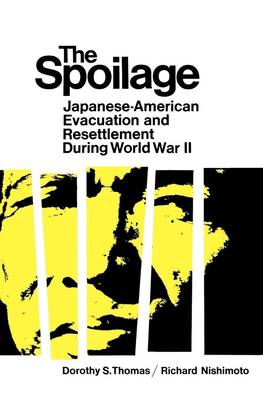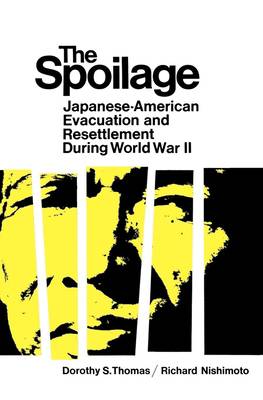
- Afhalen na 1 uur in een winkel met voorraad
- Gratis thuislevering in België vanaf € 30
- Ruim aanbod met 7 miljoen producten
- Afhalen na 1 uur in een winkel met voorraad
- Gratis thuislevering in België vanaf € 30
- Ruim aanbod met 7 miljoen producten
Zoeken
The Spoilage
Japanese-American Evacuation and Resettlement During World War II
Dorothy Swaine Thomas, Nishimoto Richard
Paperback | Engels
€ 57,95
+ 115 punten
Omschrijving
During World War II, 110,000 citizens and resident aliens of Japanese ancestry were banished from their homes and confined behind barbed wire for two and a half years. No more blatant violation of civil rights has ever been decreed by an American president, yet so strong were the currents of bigotry and war time hysteria that effective political opposition was impossible. However, a group of University of California social scientists, sensing the enormity of the outrage, organized in 1942 to record and analyze the causes, legal and social consequences, and long-term effects of the detention program. The Spoilage, one of a series of books which resulted, analyzes the experiences of that part of the detained group-some 18,000 in total-whose response was to renounce America as a homeland; it shows the steps by which these "disloyal" citizens were inexorably pushed toward the disaster of denationalization. Essentially the result of years of research by participant observers of Japanese ancestry, it is a factual record of enduring value to the student of America's troubled ethnic relations.
Specificaties
Betrokkenen
- Auteur(s):
- Uitgeverij:
Inhoud
- Aantal bladzijden:
- 414
- Taal:
- Engels
Eigenschappen
- Productcode (EAN):
- 9780520014183
- Verschijningsdatum:
- 11/06/2010
- Uitvoering:
- Paperback
- Formaat:
- Trade paperback (VS)
- Afmetingen:
- 133 mm x 203 mm
- Gewicht:
- 467 g

Alleen bij Standaard Boekhandel
+ 115 punten op je klantenkaart van Standaard Boekhandel
Beoordelingen
We publiceren alleen reviews die voldoen aan de voorwaarden voor reviews. Bekijk onze voorwaarden voor reviews.








